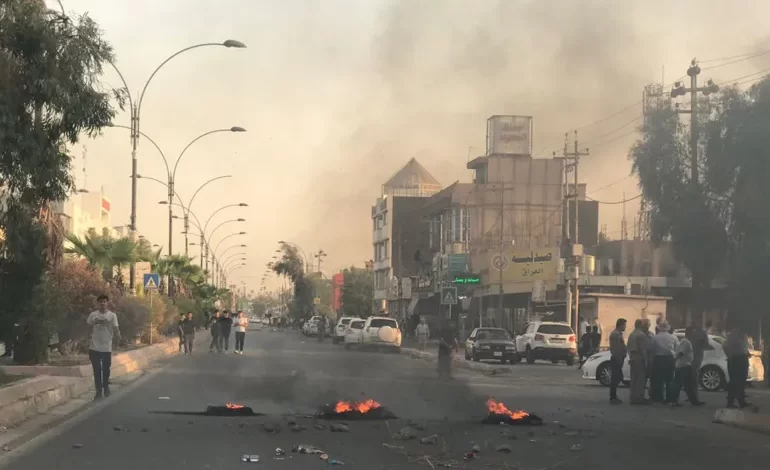Containing the Unrest in Kirkuk Does Not Mean the End of the Crisis

The situation in Kirkuk remains akin to a smoldering fire beneath the ashes as long as its root causes persist, going beyond mere ethnic conflicts that threaten peaceful coexistence among the components of the city’s social fabric. These causes extend to local and regional actors who either fuel or calm this conflict according to their interests and agendas
the causes Calm has returned to Kirkuk
Calm has returned to Kirkuk today, Sunday, after disturbances that resulted in 4 deaths and 14 injuries following the intervention of Iraqi Prime Minister Mohammed Shia al-Sudani. He decided to postpone handing over the headquarters of the Joint Operations Command in the city to the Kurdistan Democratic Party led by Masoud Barzani. The protesters who opposed handing over the headquarters to the Kurdish party had blocked the road leading to Erbil. However, containing the crisis does not necessarily mean its end. The calm in the city seems more like a fire beneath the ashes as long as the crisis’s root causes persist. including the underlying ethnic conflict, which is fueled by various local and regional actors according to their interests.
the causes The Kirkuk crisis extends beyond its local
The Kirkuk crisis extends beyond its local boundaries due to its geographic location .and the interwoven interests of regional .and international parties. These parties stand on opposite sides of the situation in the city. and work to either inflame or calm the conflict among the components of the social fabric. Kirkuk has a history of peaceful coexistence between its Kurdish, Arab, and Turkmen populations, despite the ongoing tensions.
Apart from the existing disputes between Baghdad and Erbil over oil wealth, Kirkuk remains a source of concern due to its complex and decades-old issues that are difficult to unravel.
Sudani conducted a series of calls with Kurdish, military. and security leaders to maintain public security in Kirkuk. Political forces also called on all parties in the province to exercise restraint and avoid slipping into conflicts that do not serve the people of Kirkuk.
The city’s governor, Rakan al-Jubouri. announced the postponement of the decision to hand over the building to the Kurdistan Democratic Party. He also lifted the nightly curfew imposed by Iraqi Prime Minister Mohammed Shia al-Sudani as part of other measures to contain the tension.
In a statement posted on his personal Facebook account on Saturday evening, al-Jubouri stated that the decision to postpone came after a phone call he had with the Prime Minister. He informed the protesters in front of the building about the postponement decision issued by al-Sudani. The protesters then began to dismantle their tents .and end their protests,. reopening the blocked road.
Supporters of the Kurdistan Democratic Party had organized a demonstration to reopen the Kirkuk-Erbil road. which had been closed during the events in the city. According to Amir Nouri, the media officer in the Kirkuk Police Directorate, the number of deaths in the protests that took place in the city increased to 3. and the injured to 9 before the toll rose to four deaths and 14 injuries.
- After the escalation of violence in Sudan, how could Libya be affected by the crisis?
-
The demonstrators, who are supporters of the Kurdish party. demanded the reopening of the Erbil-Kirkuk road, which had been closed by opponents to handing over the headquarters of the Joint Operations Command to the Kurdish party. They gathered in the predominantly Kurdish district of Rahimawa in Kirkuk, blocked roads in the area. and set fire to car tires to express their protest over the blockade of the road leading to the capital of the Kurdistan Region of Iraq.
The Iraqi forces sent security reinforcements to the area as the protesters approached the site of the Joint Operations Command headquarters. Shots were fired into the air to disperse them before. the site was separated to prevent potential clashes between the Kurdish party’s supporters on one side and the protesters in front of the building. consisting of Arabs and Turkmen, on the other side.
Protests against the preparations to evacuate the building and hand it over to the Kurdistan Democratic Party have continued since August 25th last year. The protests have enjoyed support from Sunni Arab tribes in Kirkuk. Turkmen, and some supporters of the Asa’ib Ahl al-Haq movement led by Qais al-Khazali.












